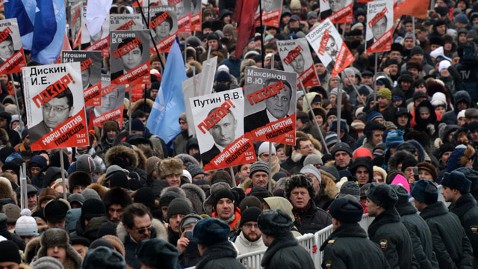Jan 13, 2013 10:37am

KIRILL KUDRYAVTSEV/AFP/Getty Images
MOSCOW — Thousands of Russians took to the streets on Sunday to protest Russia’s new ban on adoptions to the United States.
In what organizers called the “March Against Scoundrels” they paraded down a tree-lined boulevard in central Moscow chanting “Hands off our children” and “Russia will be free.” They also carried signs with the faces of Russian politicians who approved the ban and the word “Shame” written on them.
“I am not an apologist for the U.S. I am a patriot of this country. But this monstrous law must be canceled,” leftist protest leader Sergei Udaltsov told the crowd before the march began, according to the Interfax news agency.
As usual, organizers and police disagreed on the size of the crowd. Organizers estimated between 20,000 and 50,000 people turned out. Police put the figure much lower at about 7,000, but overhead photos of the protest appear to show a crowd larger than that.
Significantly smaller protests, some consisting of just a few dozen people, took place in other cities around the country, according to Interfax. A nationwide poll taken in December by the Public Opinion Foundation found 56 percent support for the ban.
But participants in Sunday’s protests accused the ban’s proponents of playing politics with the lives of children.
The adoption ban was a late amendment to a bill retaliating for a set of human rights sanctions that President Obama signed into law in December. It cut off adoptions to the United States, one of the most popular destinations for international adoptions from Russia, starting Jan. 1.
More than 60,000 Russian orphans have been adopted by Americans since the end of the Soviet Union, according to the State Department. Many of them are sick or suffer from disabilities.
READ: Unclear Russian Adoption Ban Frustrates US Families
But Russian officials have pointed to the cases of 19 children who died after being adopted by Americans. They also noted cases in which American parents accused of abusing their adopted children received, in their view, lenient sentences.
Since the law went into effect, Russian officials have struggled to explain whether the ban would cancel 52 adoption cases that had already received court approval and were within weeks of completion. Kremlin spokesman Dmitri Peskov said Thursday that at least some of those adoptions which had cleared the courts would be allowed to proceed, but did to say how many.
The ban was controversial even before it became law. Even though it received nearly unanimous approval from Russia’s rubber stamp parliament, prominent cabinet officials, including Russia’s Foreign Minister Sergei Lavrov, came out against the ban. Even President Vladimir Putin himself evaded questions about it when asked during an end of year press conference.
READ: Russians Rally to Help US Adoption Mom Fighting for Child
Since the ban was approved, top Russian officials have pledged to devote more resources to reforming the country’s dilapidated orphanages and to encourage more Russians to adopt.
Sunday’s protest was organized by some of the same opposition leaders who organized last year’s anti-Putin rallies. The last such protest, held without city approval and under heavy police presence, drew relatively few people in December, suggesting the protest movement had fizzled. Protest leader and anti-corruption blogger Alexy Navalny, however, told Interfax today that he hopes the adoption ban could rally more Russians to continue protesting.

















